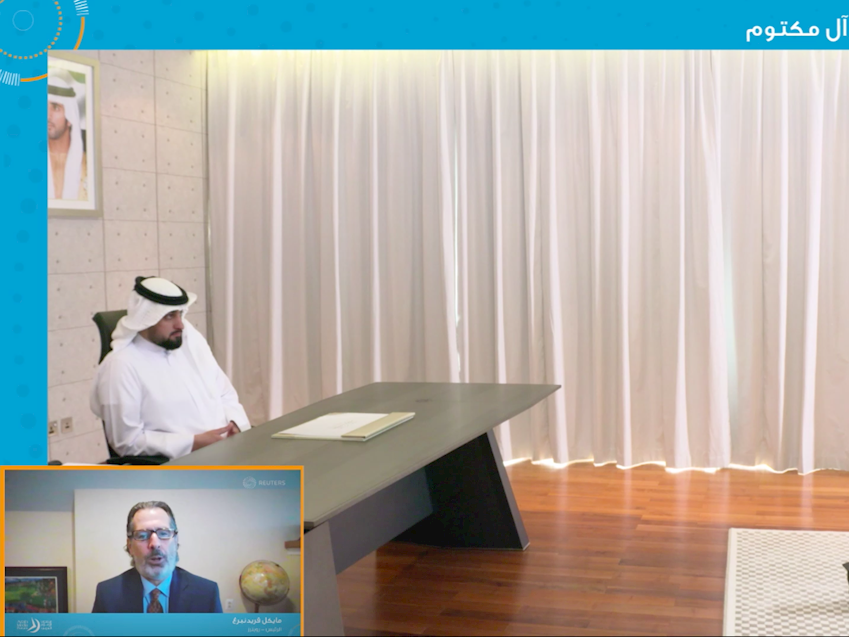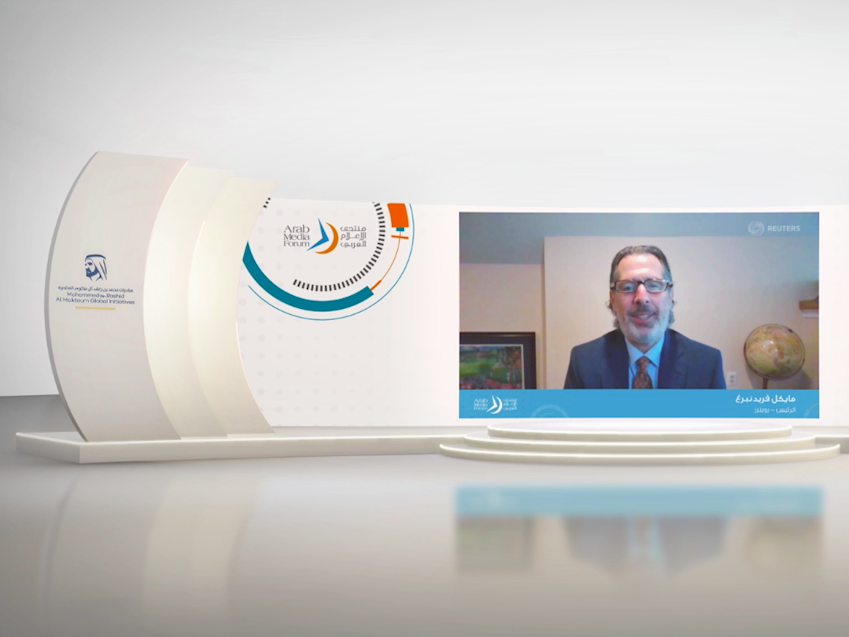December 23, 2020
2020 could be a turning point in the evolution of news media, Reuters President tells AMF 2020
2020 could be a turning point in the evolution of news media, Reuters President tells AMF 2020
Michael Friedenberg outlines a set of proactive strategies to help the industry come out of the pandemic even stronger
“Fair, independent and high-quality journalism is even more critical in times like these”
The year 2020 could be a turning point in the evolution of news media with a number of disruptive changes combined with the COVID-19 pandemic pushing the industry to develop transformative content and business models, the President of Reuters said at the 19th Arab Media Forum (AMF) organised virtually by the Dubai Press Club today.
COVID-19 has profoundly impacted our lives and our businesses, said Michael Friedenberg. Changing customer behavior, geopolitical upheaval and technological advancements present the news media with both “existential threats and incredible opportunities”. By working together in strategic partnership, the industry can come out of this pandemic and 2020 even stronger, he told the AMF audience.
Organised virtually under the theme ‘Arab Media: The Future is Digital’, the 19th AMF brought together prominent industry leaders to discuss the outlook for the region’s media sector.
Elaborating on the challenges facing news media, Friedenberg said apart from the current pandemic, the news media need to respond to a series of changes including “the rise of economic nationalism, the growth in e-commerce, the weaponisation of information, societal changes like the shift to mobile, the focus on sustainability, the impact of the global equality movement and technological changes embodied in the fundamental shift from content to commerce and the now cognitive based web.”
“Our business models are challenged as platforms dominate digital advertising and become the new gatekeepers of information. New technologies like AI and machine learning change content creation, data gathering and monetisation.”
“We are seeing further consolidation amongst media companies to achieve scale and efficiencies. We feel the threat of commoditisation as the digital ecosystem blurs the lines between publishers and broadcasters, professional and individual and even user generated content (UGC) creators,” he added.
Furthermore, the world is faced with a “crisis of trust” as misinformation proliferates, including false and misleading information about COVID-19.
The Reuters President outlined a set of key proactive strategies to help media organisations adapt to these challenges and avoid becoming “relics of an analogue age.”
“First we have to build trust. Fair, independent and high-quality journalism is even more critical in times like these. We should double down on helping the world share reliable information. We will look back on this year 20 years from now and say it was a pivotal moment for our industry, in the maturation of how content is ingested and digested.”
Underlining the need to incorporate verification in today’s content generation process, he said: “Historically, the content supply chain has been the creation of content followed by distribution. With the growth of internet and platform companies, we quickly found out that we needed to add a third pillar, verification. We now need to deliver a new supply chain in which the sequence is, creation followed by verification and finally distribution. In doing that, we make sure that we are part of the solution when it comes to fake news,” he said.
Friedenberg underscored the need for media organisations to educate news consumers in the face of misinformation. “To fully address the problem, we have to work on two sides of the model. Supplying accurate and impartial news on one side and educating users on how to discern between real and fake news on the other. Defending independent journalism and supporting media literacy should remain a part of our mission.”
Next, media organisations should relentlessly innovate in content production and sharing, he said. “This means investing in cutting edge technology, improving products based on customer experience and feedback and controlling our distribution channels as much as we can. Embracing the potential opportunities of AI will help strengthen journalism and build new revenue streams.”
Equally important is “investing in our people as they are by far our greatest asset and must be nurtured and protected. Our organisations should be places where people do their very best work by being provided the right environment, tools and support,” he emphasised.
Furthermore, media organisations need to take control of their distribution, not cede that control to others. “Investing in quality content and leveraging distribution channels, including the full range of digital subscriptions, audio, video, pictures, data and events will make media companies grow.”
He cautioned media organisations about the pitfalls of being “stuck midfield” by combining horizontal and vertical approaches. “If you’re a horizontal player, you have to have tremendous scale. If you’re a vertical player, you need to have incredible depth. If you’re caught in the middle trying that hybrid approach, I truly think, in the upcoming years, you will feel some pain,” he warned.
Friedenberg underlined the power of partnerships in the new media ecosystem. “There will always be healthy competition within our industry, but we need to forge strong long-lasting alliances that benefit us and our customers. This could take the form of collaborative journalism, industry coalitions, new commercial business opportunities, content sharing or shared platforms.”
“One thing is very clear, we must embrace change and transform our business by building on our unique value proposition and trusted news. The digital world needs reliable information now more than ever,” he said.
Held under the theme ‘Arab Media: The Future is Digital’, the 19th edition of the Arab Media Forum saw more than 10,000 people tune in to the Forum’s sessions, which were broadcast live on a special platform set up for the Forum and through the live feature on DPC’s official Twitter, Facebook and Instagram accounts. The Arab Journalism Award ceremony, which honoured 11 outstanding journalists in the Arab world, was also broadcast live.
The largest gathering of media industry stakeholders in the region, the annual Arab Media Forum has provided a platform over the last two decades to discuss ideas and solutions for enhancing the progress and prosperity of the region.







